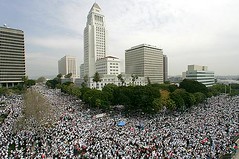My dean at time, Henry Ingle, had secured Fulbright funding for a group to go to Spain to teach about American media. But the catch was, we had to give our lectures in Spanish and be able to do a little conversing.
Thank God the emphasis was on 'little,' in that case.
But I clearly remember that as the five of us profs studied Spanish and started chatting in the hallways (practice, practice, practice our tutor told us), we got more than a few nasty looks from colleagues.
The nasty looks, I interpreted at first as the simply that they didn't like us speaking in a language they couldn't understand. But after awhile, I realized that it also a function of a strong anti-Spanish bias that they held. Had we been speaking French or German, I suspect we might have been held in higher regard.
I grew up in Brooklyn, New York, where the Spanish-speaking population was mostly Puerto Rican immigrants who flooded the city and were not particularly welcomed. Pretty strange when you think that Brooklyn was part of a giant immigrant melting pot and everybody on my street, mostly Irish, was second and third generation themselves.
But the language set the Puerto Rican folks apart and because there were so many of them, learning English wasn't that much of a priority at first.
I was in Los Angeles over the past weekend and in a couple of forays out into the city, it's obvious: Los Angeles is a city in which you better be able to speak some Spanish if you want to navigate and be comfortable.
For me, that's not a problem because since the 1980s, I've spent enough time in Spanish-speaking environments to be semi-fluent. When we make trips to Mexico, my Spanish 'ear' improves dramatically and after a week or two, I no longer have to translate words from Spanish to English to understand.
Cerveza, after all, is, well, cerveza, not beer.
But what was interesting is that most of the native Spanish speakers I talked with this past weekend - sales clerks, the maids in the hotel, waiters in the restaurants - are comfortable in either Spanish or English. I joked in Spanish with a young Latina sales clerk at Robinson-May and we went from Spanish to English back without any trouble understanding each other.
Later this morning I have to put the finishing touches on a story about how high school students are having trouble passing an exit exam to get their diplomas, an exam, as you might guess, that measures English-language skills. Native speakers of English have trouble with the test. (Can you locate the gerund in this sentence?) Non-native speakers are even more confused.
Hay una problema, amigos, but one that can be easily remedied with a little more understanding all the way around.
Or should I say the answer to that dilemma, 'es facil?'
When actor Edward James Olmos came my campus some years ago, he started his speech with this joke or anecdote, if prefer.

If a person speaks three languages, they are tri-lingual.
If a person speaks two languages, they are bi-lingual.
If a person speaks only one language, they are Americans.
If a person speaks two languages, they are bi-lingual.
If a person speaks only one language, they are Americans.










No comments:
Post a Comment